Pressure. Like none I had ever felt in my hunting career. An animal I had dreamed of for years was in comfortable range, standing broadside. Wind whipped across my face, driving a torrent of water with it. I fought to keep my crosshairs on his vitals as water accumulating on my scope lenses threatened to obscure the caribou from view. I was busted and he wasn’t going to stay much longer. The reticle settled on his chest and I slowly took up trigger weight.
Caribou are one of North America’s most unique big game animals. They are the only species in the deer (Cervidae) family where the females grow antlers as well as males. They are also legendary for their migration tendencies. The famous Porcupine Herd in Alaska covers an amazing 1500 miles during their migration. While there are many sub-species, Boone and Crockett recognize five: the barren ground, woodland, mountain, Central Canada barren ground, and the Quebec-Labrador caribou. With a population of almost 1 million in Alaska alone as well as over 2 million in Canada, one doesn’t have to look far to get into caribou country.
Caribou are an often-overlooked species in a hunter’s portfolio of options. They are widely dispersed in Canada and Alaska with numerous options for hunting them, from fully-guided to complete DIY adventures, and in almost every terrain imaginable. One can step off of an airplane and be picked up curbside by an outfitter who has the hunt pre-planned. Another popular option is to coordinate a drop-off style camp where the hunter is flown into an area and they hunt on their own with limited help from outside resources. The third method to get into caribou country is a complete DIY hunt. The hunter is responsible for the research, scouting, and transportation.
In today’s world of message boards and forums, there is a wealth of information on tips and tactics for pursuing these amazing animals. A patient and thorough search with some polite and thoughtful questions can turn up a surprising amount of people who are willing to help out a fellow hunter. This was the option I chose to best suit my needs on my first caribou adventure.
My father and I had talked about going on this hunt for years, so implementing the now-or-never school of thought we began our research. Dad had been on several “drop camp hunts” for caribou before, so we decided to take a different tack. Months of research and inquiries blossomed into a plane ride that landed on an Aleutian Island runway. We were deposited without fanfare into a rainstorm like none I had ever experienced. Hauling our packs, coolers, and rifles out of the airport, we ran into several hunters waiting to board the outbound flight back to Anchorage. We picked their brains for any intel or advice they would share. “Toughest caribou hunt I’ve ever been on” seemed to be the common statement. “Not many bulls” and “bad rain and hunting conditions” were other top contenders on the list of fresh information. We were down but not out; we figured even in a new area we would trust our instincts and research, hunt hard from the first day to the last, and have fun. Regardless of tags filled, we would still be realizing our dream of hunting caribou in the Aleutian Islands.
Two days of unrelenting wind and rain and no caribou sightings were starting to test our resolve, as well as making the “have fun” part of the trip a severe challenge. After holding a meeting of the minds we decided the only way to turn the hunt around was to move to Plan B. It involved a spike camp further out from the pressure of other hunters.
Our pre-hunt research had turned up a promising spot that deserved some attention, given the way things were turning out. We had shipped up a tent and tarp prior to our hunt, anticipating this was an option we might explore. That afternoon, with the first sunshine and decent glassing weather of the trip we hiked in as far as we could, finally spotting some caribou coming out to feed several ridges from the knob we were set up on, confirming our plan. We headed back after dark and readied our gear for the next day’s trip into the country where we had seen the caribou.
Early the next morning we loaded our gear into a boat we had borrowed from a very gracious man, with the stipulation that it be returned in the same condition. We were more than happy to agree as it cut hours of hiking off of the agenda, and would get us hunting again much sooner. We launched the boat onto the mighty Bering Sea and set off to implement our new strategy. After an hour-long boat ride we pulled into the place we decided to call home for the next week. Camp was set up as the weather started to turn for the worse again. We had just finished staking the tent fly down when the ocean weather system opened up with the wind and rain it had been withholding for the previous day and a half. We sat in the wind-buffeted tent and looked at each other as the rain blew into and under the fly. “Well, we aren’t going to get one sitting in here,” Dad said. I concurred and we put on our rain gear and boots. It was the last time they would be dry for days.
After two hours of hiking and glassing whenever the fog lifted enough to allow it, we had taken shelter behind a rock, seriously wondering if we had made the right decision. We sat huddled behind our windbreak, voices silent, not because of lack of discussion topics, but because the wind was blowing so hard we had to yell to be heard. As I thought back with fondness on early season Montana hunts, sunshine, bugling bull elk and long sleeve t-shirts, Dad kicked my leg and pointed. A cow and calf caribou were braving the weather and crossing in front of us, rain running off their windblown hides. A bull followed, moving slowly into our field of vision. Sliding my scope covers off, I laid prone on the rock that had been our only shelter seconds before. Exposed now to the full force of the storm I struggled to get my composure. I did not want to bungle the only opportunity we had been presented with thus far.
The crosshairs settled, and one shot later I fulfilled a long-time dream of taking an Alaskan caribou with my father by my side. As we took pictures and broke the bull down into game bags, not even the water pouring down into my rain gear and boots could wipe the smile from my face.
The next morning we were retracing the previous day’s hike to start packing the bull back to camp when the fog started to lift. We had learned to take advantage of these moments to glass because we didn’t know when we would get another. As I went to refill water bladders, Dad sat down and picked the country apart. I returned with water and he had good news; there was a herd of caribou bedded about a mile away. The hunt was on.
We memorized unique outcroppings and landmarks to guide us to the herd as the weather socked in yet again. The caribou stayed tight in their secluded bowl and we eased into range. Glassing, we spotted the biggest bull bedded on the edge of the herd. Dad ranged him and settled in. At the shot, we wiped the rain from our smiling faces, high-fived and hugged. The adrenaline faded and as we were still whispering excitedly about what had transpired, a herd of previously unseen caribou began to trickle through the fog into view. The cows came first and bringing up the rear was a bull that left no question I should hang my last remaining tag on him. The old monarch fell at the shot and just like that, our tags were filled and the work began. It was a moment that any hunter can understand, embedded in my memory. Gratitude for the experience, melancholy that the hunt was finished, all mingled with sadness for the inevitable conclusion that we as hunters strive so hard for. We took our pictures and prepared the bulls for the pack out.
That night in camp we replayed the day and the emotions we were blessed to experience together. The Mountain House dinner, clothes, and boots all steamed inside the tent, creating our own version of a caribou camp sauna.
After several days of packing meat, we took a load back to our original launching point with the ever-faithful boat we had borrowed. With the cargo unloaded, we turned back for our final trip of antlers and camp gear. The excitement slowly faded as the wind started to come up across the ocean. The waves started to grow as the rain intensified. Before we knew it we were at the point of no return on the water we had no business navigating. The size of our craft, as well as the power of the storm, had my stomach in knots as I realized I couldn’t turn back or we would capsize. The sheer oceanfront cliffs of the island assured we couldn’t beach the boat and wait out the storm. We had to power through the exposed portion of our journey to reach the relative safety of a bay that seemed much too far ahead. All thoughts of fun and adventure were gone from my mind, replaced with sheer terror at what we had gotten ourselves into. Dad lay down on the bottom of the boat to lower the center of gravity; I kept my eyes one or two waves ahead to pick a line through the madness. I would quarter the boat up a wave and as we crested, I would turn to quarter down the other side to keep the bow from going under. As we slid down into the trough between each wall of water the horizon would disappear from view, leaving us surrounded by steel grey swells. I mistimed one wave and it came crashing down into the boat, drenching my unsuspecting father and adding hundreds of pounds of sloshing bilge water to our craft. It wasn’t lost upon me that I couldn’t make that mistake again. I fought the boat’s ever-changing center of gravity and my own fear of what it would mean if I failed at this life-or-death challenge. After what seemed like hours, the waves began to lessen as we slowly made headway into the shelter of the bay that our camp was set in. With the boat beached we sat and looked at each other. I had to regain my composure for several minutes before I could trust my quaking legs to carry me. It was a foregone conclusion that we wouldn’t try that again so we hunkered down in the tent for the next two days to wait out the storm. As the storm finally blew out and left us, we gathered the rest of our now water-logged gear and loaded it into the boat. We gratefully pulled out of the bay for our last trip on the Bering Sea.
The months of research and preparation had paid off when supported by a willingness to be flexible, hard work and faith in our plan. As we packed gear, coolers and gun cases, I went over the lessons I had learned and tried to soak up what was left of my first caribou adventure. One thing was for sure, it wouldn’t be my last.
Sidebar: Gear for Caribou
Rifle, Ammo, and Optics
My father and I both used Winchester Model 70s, chambered in .270 and fed a handload that my grandfather developed in the 1960’s using a 130 gr Hornady Interlock and IMR 4350 powder. Rifle scopes used were Leupold Vari X 3s. Both performed to perfection, never fogging despite the wet conditions. Binoculars that worked well were the Zeiss BTP 10×40 and the Leica Duovid 8-12×42. A rangefinder was a requirement in the open terrain; I used a Leica 800 that enabled us to range caribou in all kinds of weather.
Clothing and Raingear
Clothing used was Sitka base layers under Cabela’s Space Rain. Both layers worked tremendously, the rain gear shed water in the most brutal storms and the base layer wicked sweat away as we hunted.
Footwear
Hiking boots that stood up to the rocky terrain and moisture were very important, we used Kenetrek Mountain Extreme non-insulated with good success. We also wore Cabela’s Instinct pull-on boots for very rainy weather.
Camp Gear for the Wet
We relied heavily upon our Cabela’s Alaskan Guide 4 person tent. Some nights there was water running underneath it and it never leaked. Synthetic sleeping bags were a must in the wet conditions; we used Mountain Hardwear Lamina 0 degree bags with great results.
Other Gear
I hauled hundreds of pounds of gear, meat and antlers with my Eberlestock Just One pack and it worked great. It would hold more weight than I could carry. Trekking poles were essential on the sloped, slippery terrain. We also used a small, one burner Coleman propane stove for cooking as well as drying gear at night.


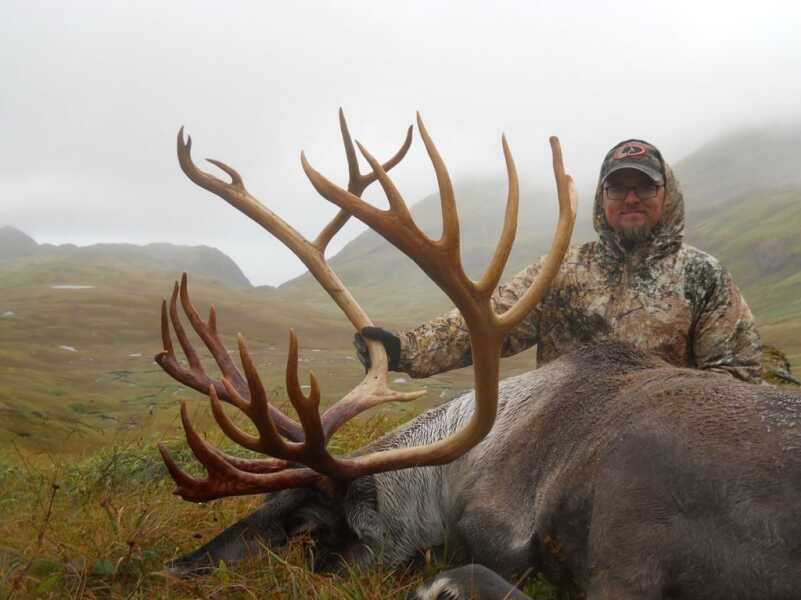
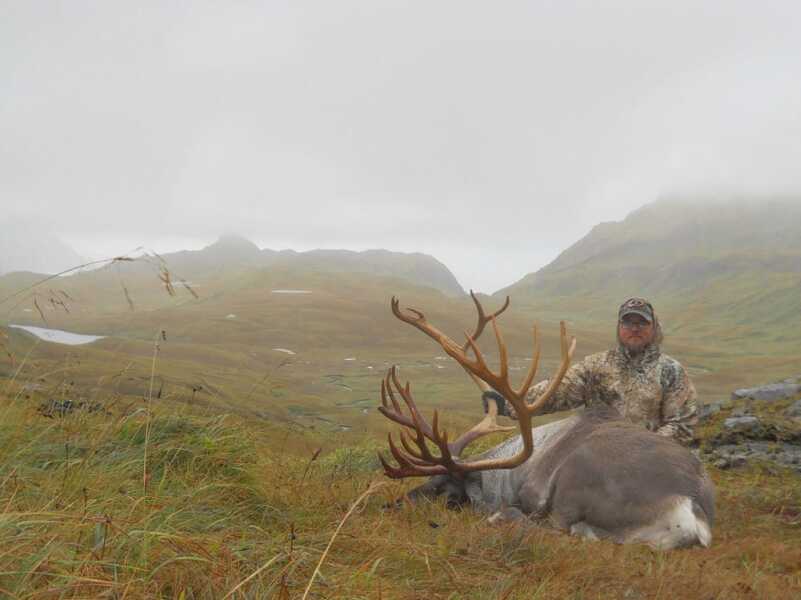
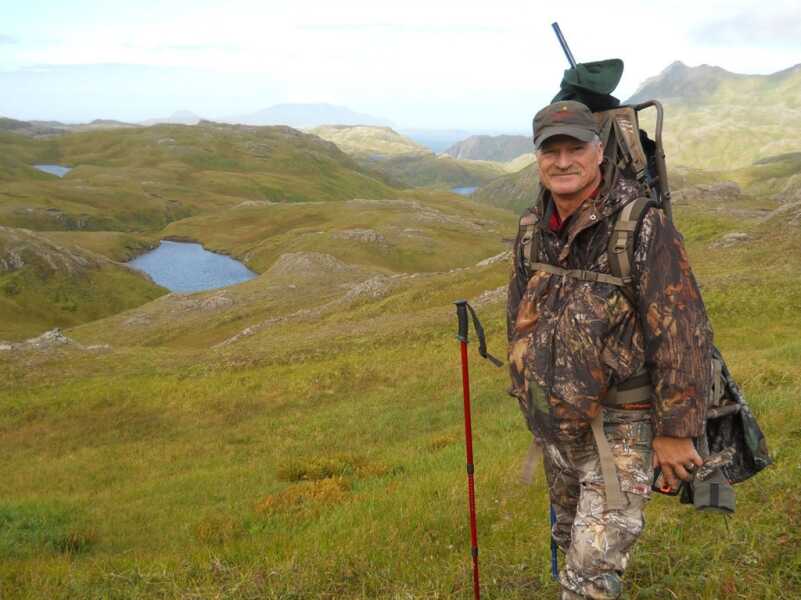
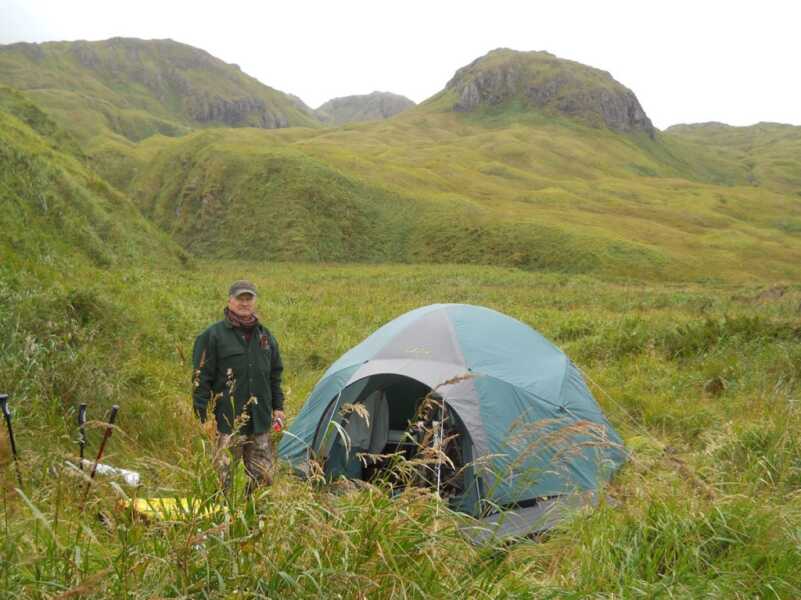
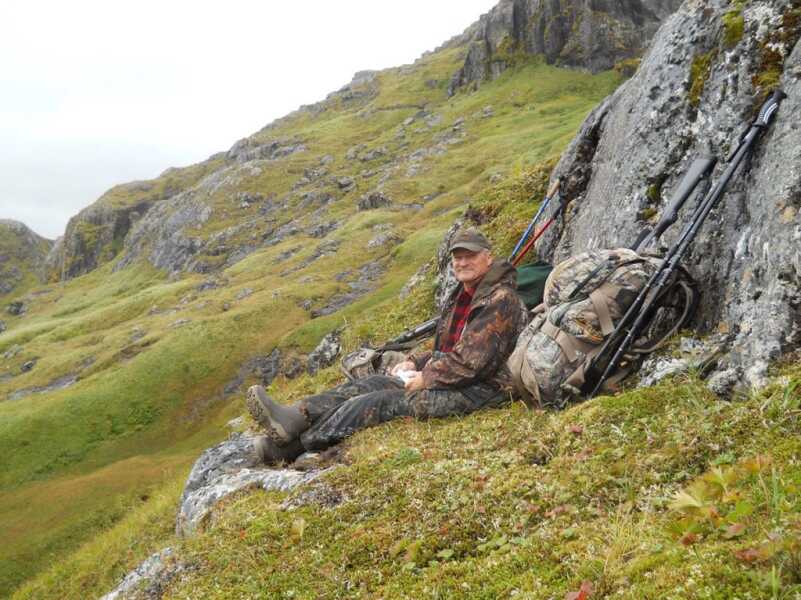
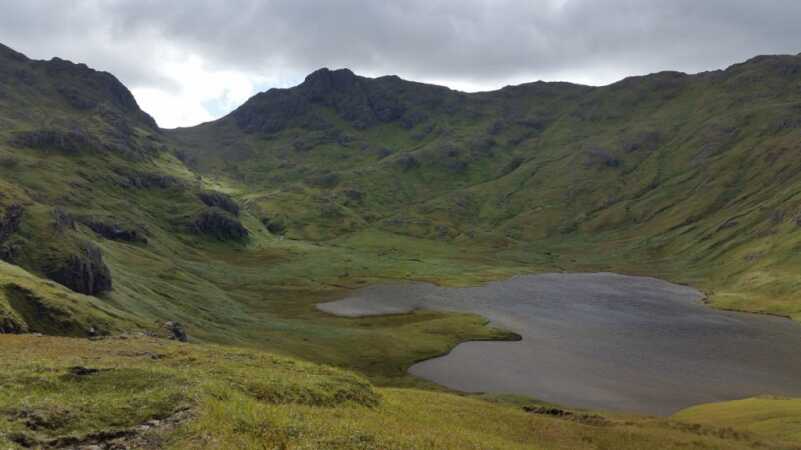
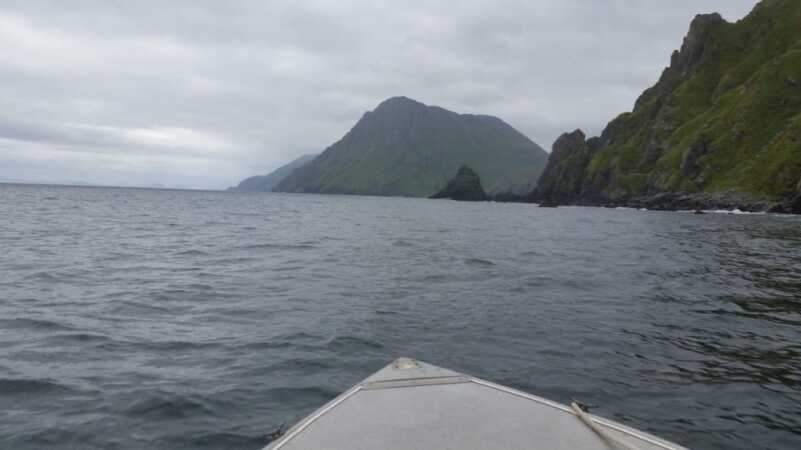
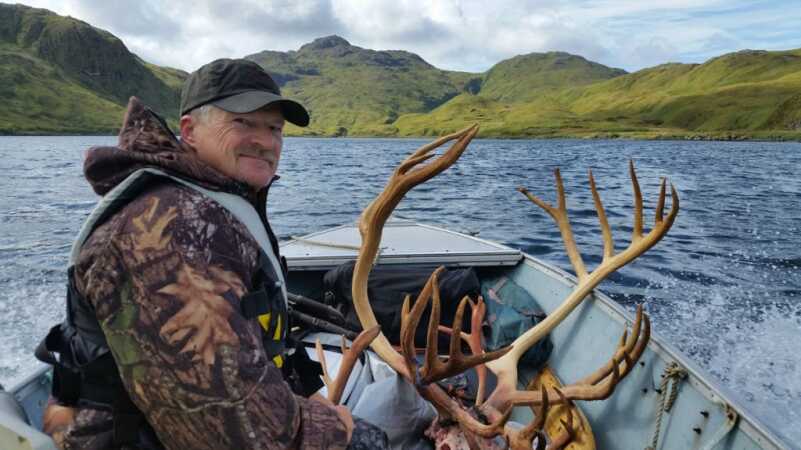
now thats how it is done!
This hunt was on Adak, Alaska. They rented rooms at our lodge. http://www.aleutianoutfitters.com
Adak has barren ground caribou that can grow extremely large bodies. There are other islands in the Aleutians that have reindeer as well.
Congratulations on your hunt and your bull!
I’m about 99% sure this is beautiful Adak Alaska. I just spent two weeks working there and I recognize some of the landmarks. Not sure why the author does not mention the location. Adak is the farthest west municipality in the USA being even further west than Hawaii. It is a ghost town of rotting old houses and unmaintained infrastructure that will make you shake your head in disbelief. There are much better places to go hunt caribou in Alaska than out there. The Welcome mat in the Alaska Airlines terminal (only 2 flights per week BTW) states: “Welcome to Adak, Birthplace of the WInds”. The little boat ride they experienced is why hunting in AK is no joke. They were lucky.
Great Story and Pictures! Love to Caribou Hunt. I was lucky enough years ago to make two trips to Northwest Territories to McKay Lake Lodge with True North Safaris (Gary Jaeb) and Harvest 4 Record Book Caribou with Archery. We dealt with the same types of weather conditions at times and can fully relate. I recall one boat ride back to camp that I was not sure if this was going to be our last hunt as the storm was brutal and now in the total darkness on the water cruising shorelines until 1:30 am. Crazy, but memories of a Lifetime! Trips like these are what make lasting memories to cherish forever, especially with your father! Congratulations on your Successful Hunt and Thanks for Sharing your Story and Hunt!
Thanks for the comment, Chuck. Sounds like you had quite the adventure yourself!
I felt like I was right there with Jordan and his father on their hunt. This is a hunt I have always wanted to be on. Thank you for great writing and photography.
Thank you, Rick. I’m glad you enjoyed it.
Nice reindeer!
Nice hunt! I live in the Aleutian Islands, we took 4 Reindeer in 2 days this year. Usually like fish in a barrel if you know where to go.